IN MEMORY OF THOSE WE SHOULD NEVER FORGET.
All my factual stories, I believe are correct, so if there are any errors, please let me know. This true story is about the build up to World War 1 and how it affected the Dorset Constabulary and in memory of all that lost their lives and suffered for us.
Outside the county of Dorset, espionage was being committed and keeping the Met’s Special Branch busy in the big cities and ports of our country. At the Hampshire Assizes in June 1913 Wilhelm KLAUER (alias William KLARE) was imprisoned for five years for trying to obtain details about the submarines and their torpedo’s at Portsmouth dockyards after receiving authority from his superiors in Berlin to purchase the information from a naval book. The Special Branch were heavily involved with background checks on the 28,000 plus aliens in the UK of which 11,000 were German or Austro- Hungarian. Numerous observations were being kept on possible spies and houses in different areas of London and other military locations, for which more spies would be imprisoned in 1914. The Constabularies of or Country were well aware of spies being around and those in the know were trying to stop the Germans from getting hold of even the smallest piece of information that would help them.
In 1914 Dorset Constabulary started off like most previous years with the subject of the Force’s man power being discussed in February at the first quarterly meeting of the Dorset Standing Joint Committee (DSJC). The Chief Constable (CC) Captain GRANVILLE wanted a redistribution of his officers in light of the last population census. This was based on population figures of the county in the 1911 census, with the Force having 193 officers in total. The Poole division at the time had 42 officers, so working on the ratio of one constable to 1000 people it was calculated the Force was short of six constables.
The CC decided to get rid of local beat officers at Hooke, Milborne St Andrew and Shapwick. One constable was moved to the Canford and Corfe Hill beat, another to the Swanage and Studland beat and an additional one to help at Wyke Regis. Remember, at this time the Force was still using horse and traps, but in the main shank’s pony.
This photograph is from February 1912. It shows the 10 superintendents with the CC . These officers were still in position till early 1914.
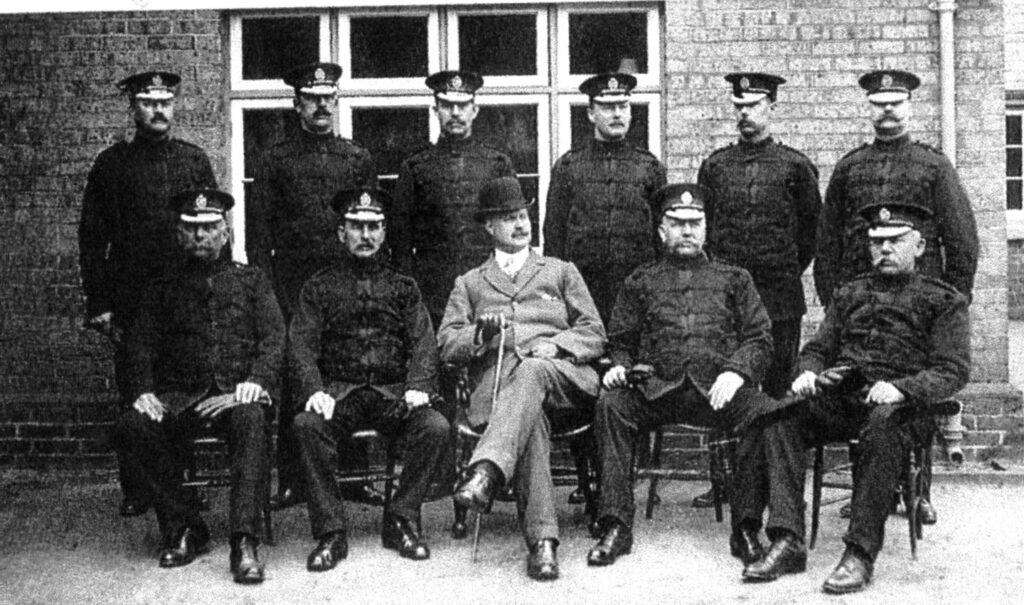
In February 1914, four officers put in their notice to retire, 2nd class Supt James COLLINS from Sturminster Newton, 1st class Sgt Samuel SYMES from Poole, 1st and merit class Sgt Albert ORCHARD from Wool and 1st class PC 74 George HELYAR from Shapwick ( see separate article on PC HELYAR later). COLLINS was struck of strength from the Force on the 28th , SYMES on the 2nd March, ORCHARD on the 24th March and HELYAR on the 31st. The knock on effect of COLLINS retiring, was that Sgt Victor WHITE was promoted to 3rd class Supt and moved from Bridport to Sturminster Newton and he was replaced by Sgt Frank BISHOP, who on the 31st March, left Lyme Regis. Sgt James STOCKLEY moved from Cranborne to Lyme Regis. PC 143 John ELLERY was promoted to 2nd class Sgt and moved from the Charmouth beat to Cranborne. On the 10th March, PC 119 Reg KENT was promoted to 2nd class Sgt and moved from Puddletown to Dorchester . He took over from Sgt Reg HAYWARD who then took over from retired Sgt SYMES at Poole. Sgt ORCHARD was replaced at Wool after PC 56 Henry MATTHEWS was promoted to 2nd class Sgt on the 28th March vacating the Fontmell Magna beat.
In early March, PC 103 Benjamin HART was caught by his Sgt, Sgt HAYWARD with “having a female in his bedroom” at his quarters in Gillingham. He was dismissed from the service by the CC on the 5th March.
The next matter to be discussed by the DSJC , was the annual allowance of 52 days off a year. The CC wanted to control it, so each officer got a period of 14 days annual leave , plus having to take 3 days every month and that left two days to be taken at a convenient time. This meant more officers were required to fill those gaps, and consequently more recruits were needed. The CC further added that he required an extra Sgt and 16 more constables to cover the annual leave. One constable was required at Blandford, two at Bridport, two at Dorchester, one at Portland, one at Shaftesbury, one at Sherborne, one at Wareham, two at Wimborne and five were needed at Poole plus the extra Sgt. The committee decided that with such a large body of men required they would put the request forward to the Home secretary so the CC could start recruiting. The cost would be about one thousand six hundred pounds extra per year so it was a substantial amount for the DSJC , that were always struggling to find the money. This would be the equivalent of 180,000 pounds plus, in 2020.
In the General Orders on 28th February it was stated that the Home Secretary had given his sanction to the augmentation of the Force by one Sgt and sixteen Constables for the purpose of putting into force the provisions of the police (“weekly rest day”) act 1910, which was to be adopted on 1st July 1914.
PC 51 Frank MILLER was promoted straight away, becoming the 25th Sgt and was given the same collar number, Sgt 25. 17 new recruits on the waiting list were told they had jobs.
Times were greatly changing, with more time off and more chance of men on the “reserve list” getting in the Constabulary earlier. With that in mind I thought I would add this postcard photograph I was left, which has none of my family members. It shows 13 recruits in their civilian best clothes and their training Sgt.
This was a large intake to be trained at once, so it was logical that the photograph could be from 1914. There is no information written on this postcard and it was never posted although it is obvious it is inside the Dorchester HQ main entrance.
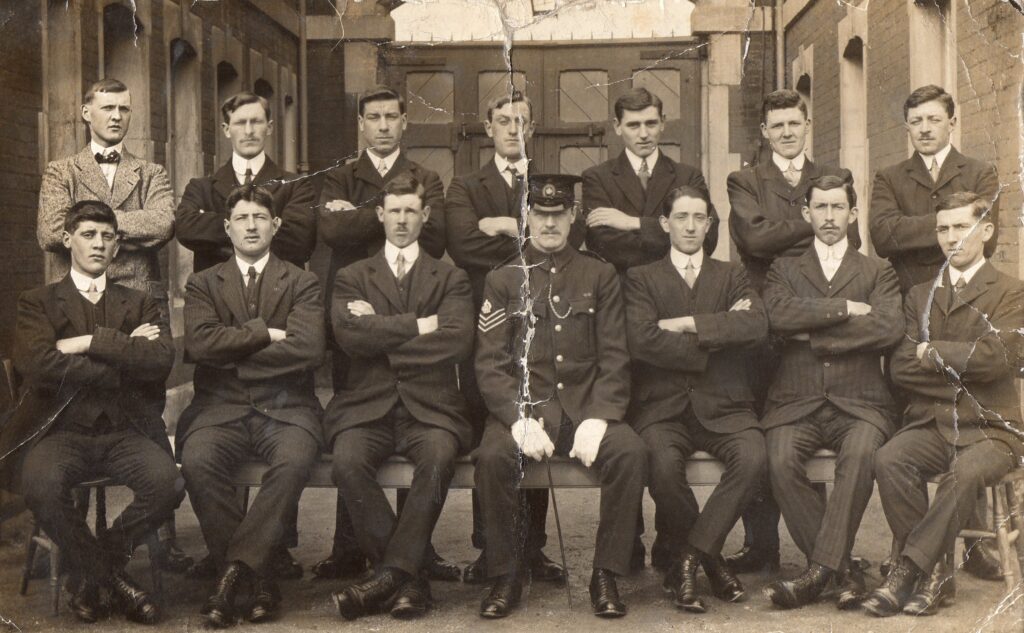
(You can read a separate article on the rank of Sgt Major later)
I looked at this photo for several years and had not identified anyone else and always wondered if this was taken in 1914 and how many of these men actually took part in and were lucky enough to survive WW1. I have now identified the following: PC 165 Albert HILL , back row who is 5th from the left and next to him 6th is PC 167 Sidney Charles OSMAN. Seated on the front row are PC 164 Sydney BIRKINSHAW 5th from left and 6th PC 143 Wilfred LOCKYER. I cannot be certain who the others are but they may include and are likely to be these officers based on their joining dates.
PC 119 Walter Henry BAILEY
PC 42 Tom Charles RIDEOUT
PC 51 Robert William NOTLEY
PC 166 Reginald Atwood WOOD
PC 168 William Cecil TOOP
PC 169 William Alfred PAINTER
PC 170 Alfred George DURRANT
PC 34 Robert OTTER
PC 103 Arthur William TRENT
These young men were most of the additional recruits needed to expand the Constabulary in light of the extra time off and by deduction the recruit photograph above was taken in late March.

At the beginning of April, 1st class Supt Solomon DENNETT from Dorchester, also requested to retire on pension. DENNETT was struck of strength on the 9th April which meant the following day Supt Albert KING moved from Beaminster to Dorchester, Supt William SAINT moved from Portland to Beaminster. Sgt Ernie SPRACKLING of Dorchester having passed his examination was moved on promotion from HQ Admin to Supt of Portland and PC 128 Alfred BARRETT after passing his exam was promoted to 2nd class Sgt and replaced him at Dorchester HQ as the clerk. As a result other changes that occurred were, 7th April, Sgt George ANDREWS moved from Wimborne to Poole replacing Sgt Robert OTTER who moved to Blandford. Robert OTTER replaced his brother, Sgt Tom OTTER, who moved on to Sherborne and Sgt Alfred PRIDE then moved to Broadstone replacing a senior PC ( a new post for a Sgt) which was part of the Wimborne Division. As there were now too many Sgt’s posts, the CC decided to abolish the Wimborne town Sgt’s post and sent senior PC 146 Abner BARRETT there from Poole. PC 22 Frank DAY moved to Dorchester HQ from the Oborne beat near Sherborne, to his new job as assistant clerk. The first of the new recruits in the photograph above were also posted from HQ. PC 143 LOCKYER to Gillingham to replace sacked PC HART and PC 119 BAILEY was posted to Blandford. On another bad note, PC 105 Charles STUART was investigated for being absent from his beat on the High St at Poole, at 1825 hours on 23rd March. He was found in a pub drinking and then also lied to his Sgt. He acknowledged his oversight, was cautioned and fined 10 shillings.
By the 25th April more of the new recruits in the photo above had been posted from HQ. PC 143 LOCKYER who had been told he was going to Gillingham was then sent to Poole instead and PC 166 WOOD was posted to Gillingham. PC 42 RIDOUT to Wyke Regis and PC 51 NOTLEY to Branksome. A few days later PC 165 HILL was sent to Sherborne and PC 167 OSMAN went to Bridport. On augmentation of the “weekly rest day act”, PC 164 BIRKINSHAW was posted to Shaftesbury, PC 168 TOOP to Poole, PC 169 PAINTER to Wareham and PC 170 DURANT to Wimborne.
The CC was very concerned about speeding motorists at this time although it was called” Furious driving” in those days and on the bank holiday weekend at the end of May, officers were instructed to make a list of all cars seen, note the time, their registration numbers and whether driven carefully or not and forward the list to their Supts.
In May, PC 58 Robert BOLLEN was caught in the White Horse Inn at Maiden Newton, “treating his prisoner to drink”, whom he was escorting to prison. Because it was his first mistake since joining in 1910, he was just severely reprimanded. Poole’s police strength was again discussed by the DSJC at the next meeting and they decided that another three constables could be recruited. For years the large land owners in Dorset had been given special treatment by the County and the CC and been given the services of the Constable on a permanent basis. PC 28 Sidney BARTLETT was informed that he was no longer required at Canford House, under the service of Lord WIMBORNE and was posted to Cranborne, merging back into the Force on the 1st June.
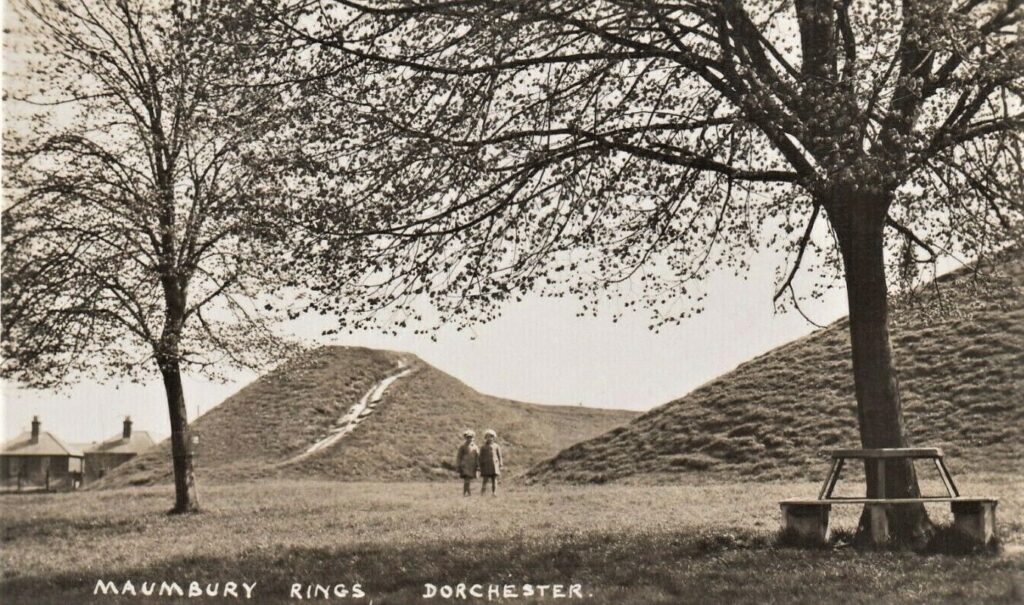
Photograph with the police station in the background.
During June, other new officers who had been recruited were posted namely, PC 74 Robert John BROMFIELD to Sherborne, brothers PC 56 Frederick MONTAGUE to Parkstone and PC 171 Harold James MONTAGUE to Dorchester. PC 172 Harry Thomas RIDEOUT to Lyme Regis, PC 128 William John JOYNER to Portland, PC 173 George CLOTHIER and PC 175 Alfred John WINTLE to Bridport and PC 174 Arthur Augustus WHITE and PC 177 Ernest Edwin PARK to Poole. On the 27th June PC 45 Joseph JAMES from the Chedington beat retired after gaining pensionable age, and he would be the last to retire on pension before the start of WW1.

By July the extra constables had settled into their postings so the Supt’s had now sorted out the new leave periods for some very happy Sergeants and Constables, now looking forward to their extra rest periods. The three recruits now needed at Poole were trained up and posted. They were, PC 176 Edwin David BEST, PC 178 Isaac HARRIS and PC 179 Hubert Charles SCREEN. Another recruit PC 180 Philip Charles LAWFORD at the same time was posted to Dorchester, but he only lasted a few months as he was unfit for the Force.
Whilst the new recruits were being paraded on at HQ by drill Sgt William WHITE, the politicians in Whitehall were discussing the events that were unfolding, since the assassination of Arch Duke Franz FERDINAND in Sarajevo at the end of June. Our Royal Navy were busy in the English Channel on exercise and from their vantage point at Wyke Regis the local PC’s 65 Joe SWAIN and 42 RIDEOUT, watched the impressive mass of ships in Portland harbour.
On July 8th the annual meeting of the Dorset Constabulary Athletics Association took place and was not spoiled by what was going on in Europe. The 19th meeting was run with military precision and timing by Drill Sgt William WHITE. The Southampton Borough Police band played the music, as usual in between the events and in the marquee later for the evening dance. There were various other entertainments, including RODIN the knockabout cyclist who did “funny falls”, a wire walker and equilibrist called LEVARDO and an amusing troupe of acrobats. Various members of the Army Dorset Regiment acted as starters and judges and the senior policemen acted as the other officials. PC Joe SWAIN who was acting as the telegraph clerk, attended with his Portland divisional Commander Supt Ernie SPRACKLING who was the Honourable Treasurer of the association. Supt SPRACKLING captained some of his men to take part in the inter division tug of war competition, which unfortunately they lost in the final to the Wareham division under the command of Supt Harry TOOP. In the main tug of war competition, eleven teams entered, which included teams from the Royal Navy ships, HMS Temeraire and Southampton, the Royal Marines Artillery from Portsmouth, the 28th and 30th companies from the Royal Garrison Artillery at Weymouth and as usual teams from the Bristol and Somerset Constabularies. In the final Dorset were pitched against their old adversaries Bristol but managed to win after two pulls.
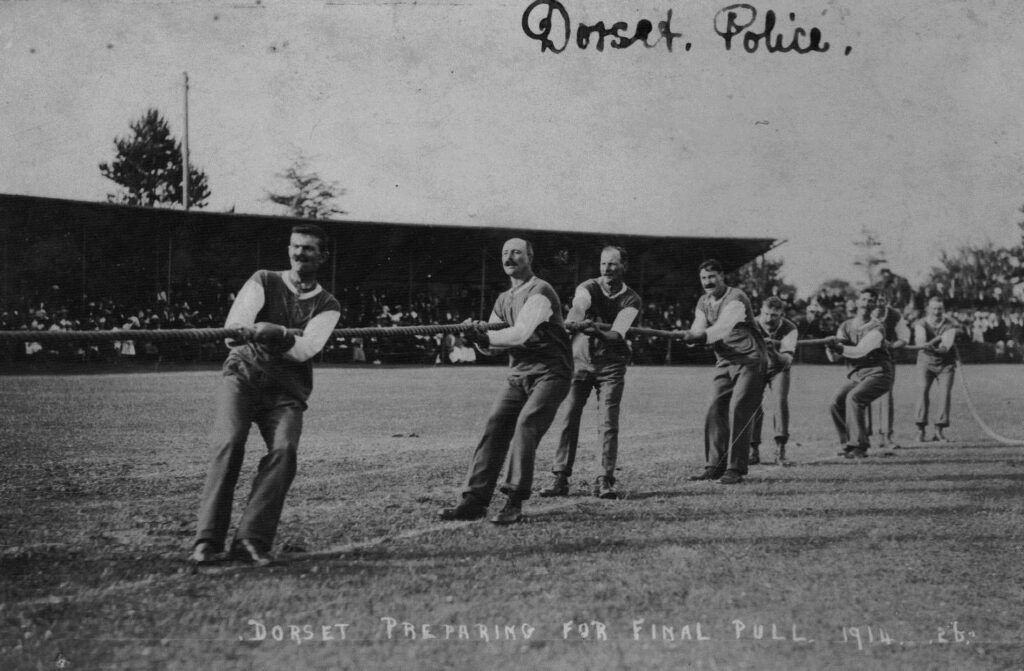
There were lots of other exciting events to take part in and one of the new recruits Ernie PARK won the half mile flat race for officers with less than three years service beating other probationary officers, PC 116 Eden COX, PC 19 William GALE and PC 94 Tommy CARTER.
The below recruits must have joined in late July as PC 34 Robert William OTTER son of Sgt Robert William OTTER, resigned on the 24th July, not long after being caught drinking in a public house at Swanage and “other improper conduct” for which he was fined 5 shillings.
PC 45 Albert Thomas HARDY was posted to Swanage to replace OTTER.
PC 34 Samuel LAKE was posted to Poole.
PC 139 Frederick BURROUGH was also posted to Poole in October.
PC 181 ? WILES , first name not known, did not make it through training and was replaced by PC 181 Arthur STEELE who was recruited after 11th September when WILES resigned.
On the 29th July the Fleet of the Royal Navy were moored up in Portland Harbour under the order of Winston CHURCHILL, the first Lord Admiral of the Fleet. The ships had filled up their coal holds again and took on missiles from the Whitehead Torpedo Company at Ferrybridge, Wyke Regis and as discretely as possible left their moorings as there was the threat of an attack. By the 3rd of August Germany had declared war on France and invaded neutral Belgium. In response Britain sent Germany an ultimatum to withdraw which Germany ignored. The following day at 1100 hours Great Britain declares war on Germany. On the 5th the new aliens bill was introduced in the House of Commons and that night received the Royal Accent to replace the unsatisfactory act of 1905. Three days later the Defence of the realm act was brought in and the Home Secretary Reginald McKenna signed the necessary orders to tighten restrictions on aliens. Aliens now had to register their names and address with their local police forces. On the same day the 3rd (Old Militia territorial soldiers) Battalion of the Dorsetshire Regiment were mobilised from their Dorchester barracks under the command of Colonel E C CASTLEMAN-SMITH. The Battalion had to manage mobilisation of several hundred reservists and to defend the county’s key points. One company marched to the camp at Wyke Regis, to defend Upton Fort at Osmington, Whitehead Torpedo Works and also the waterworks at Sutton Poyntz and Upwey. On the same day a German national called Cristian William SCHUTTE who had lived at Emmerdale Road, Weymouth for the last two years was in front of the Borough Magistrates, charged under the Official Secrets Act with communicating to another person a sketch plan, notes and other documents and information calculated to be useful to the enemy. He was remanded for a week in custody. The case was heard on 11th August where SCHUTTE, who worked as a cargo hand on the Great Western Railway was found not guilty, however when released from custody he was immediately rearrested under the Aliens Restriction Act 1914 and later after spending a short time in Dorchester Gaol was deported.

That month many officers around the country re-joining their colours (the armed forces), the below seven officers were from Dorset.
PC 40 William GUPPY re joined the Royal Fleet Reserve on 3rd August, after leaving 10 years previously. He had joined the Navy on 29 Aug 1899, just after his 17th birthday, although his Navy record says he was 18. In 1900 he signed up for another 12 years in the Navy and served on various ships until 1907 when he became a policeman and was put on the reserve list. Below you can see “Bill” GUPPY standing on the far left in his grey uniform, so this photograph is taken in the first five years of his police service and before WW1. GUPPY after passing out from Dorchester HQ was posted to Portland in early May 1907 and stayed there till moving to Abbotsbury in August 1911. At that time he married one of retired police Sgt’s Joshua RACKHAM’s daughters, Pamela and was still in Abbottsbury with his wife and two children when he was called up.
PC 101 Sidney BAIGENT, 32 years old and married, Royal Garrison Artillery.
PC 14 Stephen REED, 27 years old and married, Coldstream Guards.
PC 155 William LEWIS, 27 years and married, Somerset Light Infantry.
PC 19 William GALE, 23 years and single, Grenadier Guards.
PC 177 Ernest Edwin PARK, 22 years old and single, Army Service Corps.
PC 25 Alfred Charles KNIGHT, Dorset Regiment
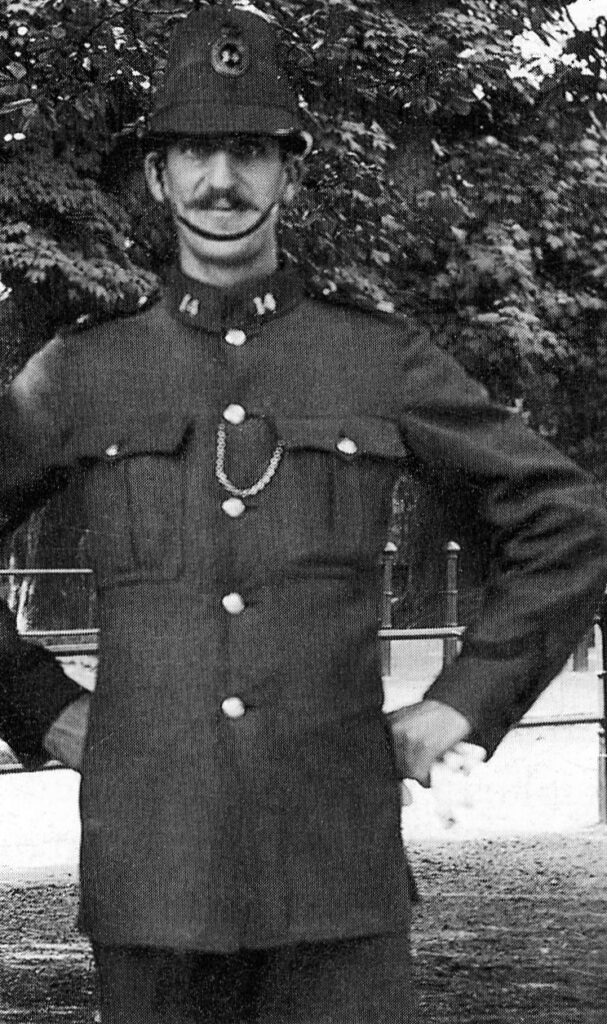
Photograph of PC Steven REED, with thanks to Melvin HANN.
Pte Stephen REED who had been a PC for 4 years was on route to France on 13th September after attending his guards barracks in London. He had been married for just over a year and had a 6-month-old son. (A photograph of PC REED in the Bobbies on the Beat book on page 36 and you can see why he was a guardsman) . Sgt Sidney BAIGENT of the Royal Garrison Artillery was mobilised on the 17th September just two days after one of his younger brothers Ernest BAIGENT was killed in FRANCE with the Royal Berkshire Regiment. Pte 7949 Ernest Alfred BAIGENT of the 1st Bn, Royal Berkshire Regiment was 30 years old and had served for 7 years in the regulars and in 1914 returned from India. Being on the reserve list he re-joined and was at the front in September where he unfortunately died whilst retreating from Mons and is buried nearby in France.
PC William LEWIS had been married for 4 months, he served in the Somerset Light Infantry for about 7 years before joining the police in 1911. I have been unable to find his WW1 military record.
PC William GALE had been in the Grenadier Guards for about 3 years before joining the police in either 1912 or 1913.
PC Alfred KNIGHT had been a PC for two years, being based at Dorchester and Blandford before being called up for the BEF.
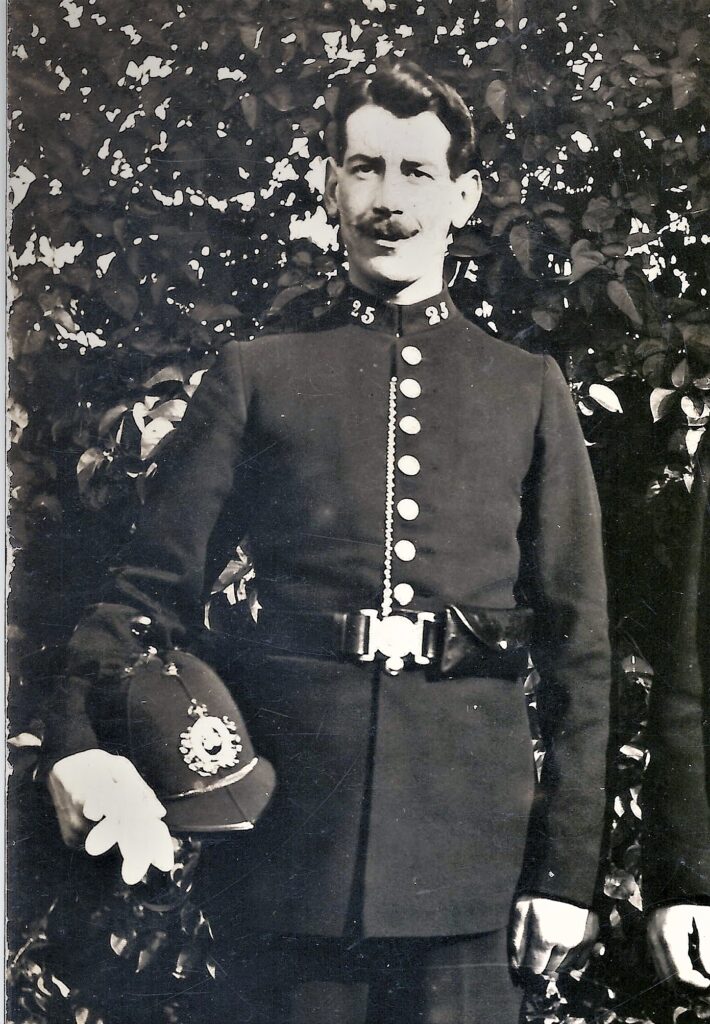
He had served for 7 years and 211 days with the Dorset Regiment before joining the Dorset Constabulary. Unfortunately or luckily for him he only saw 21 days service in France and Belgium before then being invalided out on 23rd April 1915 with TB or Typhoid which although not serious was enough for him not to be able to fight on. There is no record of him returning to the Constabulary and on getting married in June that year he is recorded as being a Tram conductor in the Poole area.
The CC managed to facilitate enough retired/ex officers to fill in the gaps where permanent officers were now watching the vulnerable points along the coast and of those to fill the posts, who had been recalled to the colours of the Army and Navy. All ex sergeants were to be paid at a rate of 6 shillings per day and ex constables were paid at a rate of 5 shillings a day. The following pensioners re-joined the Force as supernumerary officers straight away between the 5th and 15th August.
Supt Solomon DENNETT
Sgt Henry NEW
Sgt Henry BATTRICK
Sgt CHAFFEY ( two possibles,not sure which one)
Sgt Fred SMYTHERS
Sgt SPRACKLING (two possibles, not sure which one)
Sgt David NORTHOVER
Sgt Sidney OSMAN
Sgt Frank BEST
Sgt Samuel SYMES
Sgt William KIMBER
PC George HELYAR at Abbotsbury
PC James DYER
PC Harry BAULCH
PC Tom CUSTARD
PC Albert HOLE
PC John HINE
PC Lewis CONQUEST
PC James SEARLEY
PC William FREAK
PC SHEPPARD ( probably Henry)
PC Edwin HUTCHINGS
PC Herbert BARRETT
PC CHURCHILL, (not sure which one, either Tom or Charles)
PC STONE (probably Benjamin)
PC William TALBOT
PC Charles LUCAS
PC Henry ELLIOTT
PC ELLIS , (not known to me)
PC James WEBSTER
PC Joseph PEARCE
PC Fred HARVEY ex PC 121
PC CARTER (unsure which pensioner)
PC Fred HANSFORD
And special constable Frank DENNETT, more than likely son of Solomon.
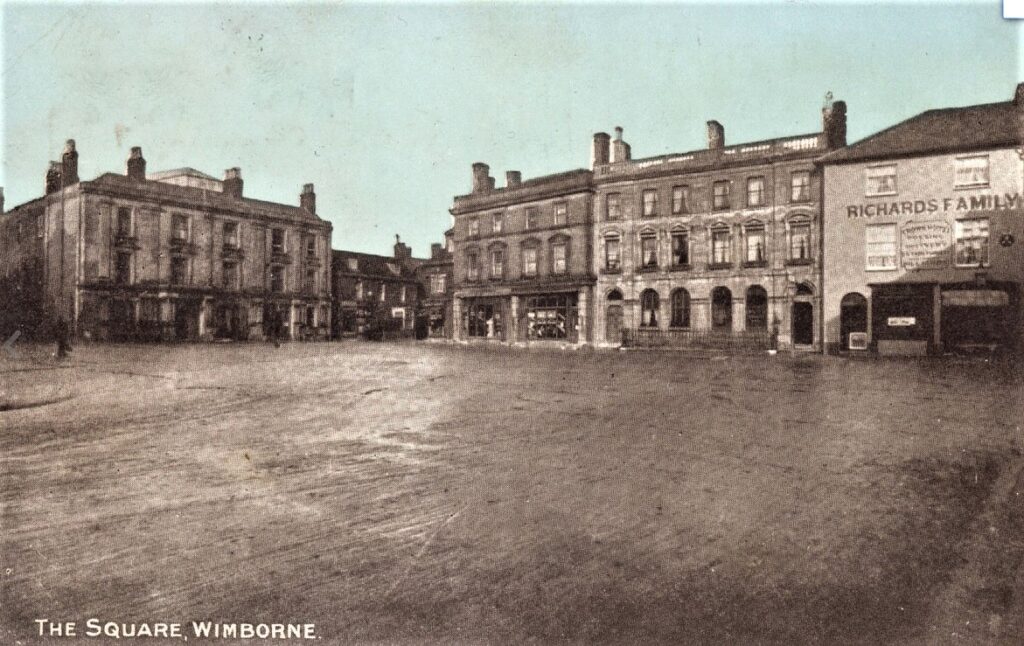
From Aug 6th to the 10th, 134 men from the Royal Welsh Fusiliers were accommodated in the Shirehall, on West street, Dorchester and various officers from the Scots Guards stayed in the Judges Lodgings within the building from the 16th August to the 14th October. On the 6th September one of those officers was called up urgently to the front and took with him two pairs of blankets and one feather pillow, the property of the Lodgings, for which payment was later received and the items were made good use of.
On 7th August, the Western Gazette printed an article, stating 50,000 boy scouts were ready to help their country. Sir Robert BADEN-POWELL said that each county had 1000 scouts, some already making themselves useful to the war effort. They had offered their services to the Police, the Post Office and to other branches of administration. Large numbers were already engaged in watching the coast, railway lines and tunnels and some had obtained leave from school attendance from their local education officers. Other duties they could carry out would be: establishing communications as a dispatch rider, signallers and wireless operators, guarding bridges, culverts and telegraph lines against damage by individual spies, collecting information as to supplies and transport available, carrying out organised relief measures among inhabitants, helping families of men employed in defence duties and forwarding dispatches dropped by aircraft. In our day and age, it seems quite amusing but anything they could help with would help towards winning the war.

On the morning of 10th August 1914, the first Prisoners of War (POW’S) arrived by train at Dorchester, after travelling from Falmouth in Cornwall. They were met by the 3rd Battalion of the Royal Scots Guards, as were 89 more POW’S who arrived at 1800 hours and were marched to the old Royal Horse Artillery (RHA) Barracks at Poundbury. This was repeated the next day and on all of these occasions many members of the public gathered to watch, but there were no demonstrations. Some of these POW’S arrived at the Southern Train station next door to the Police County HQ and by the end of August there were almost one thousand POW’S resident in the RHA camp which would increase almost five-fold by the end of the war.
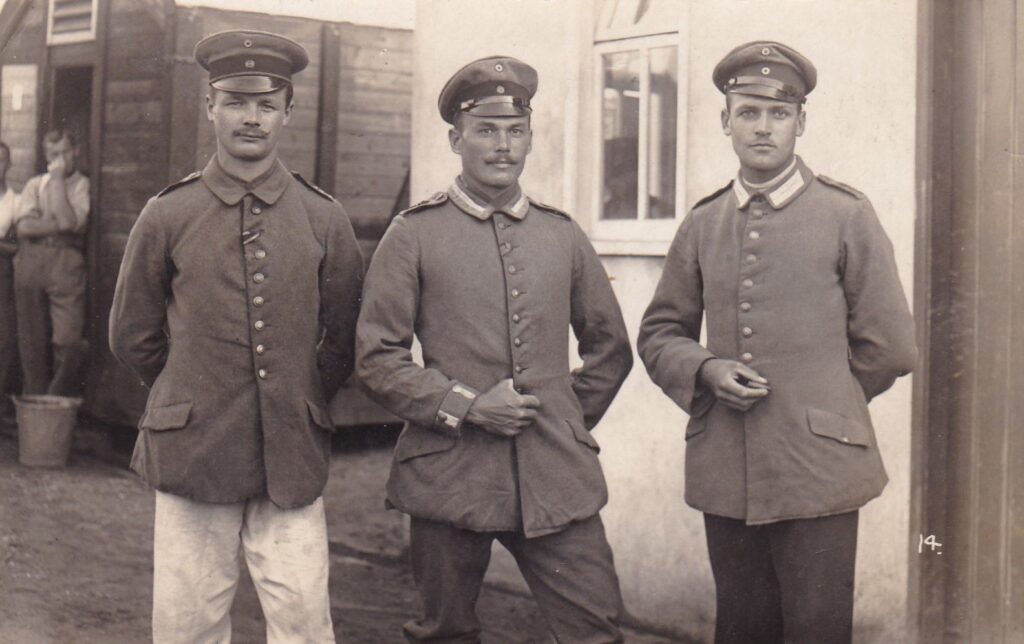
On 11th August there was an incident involving the military guard on duty at the railway tunnel at Bincombe, running under Ridgeway Hill between Dorchester and Weymouth. This was a strategic point on the line which needed security because if the route was damaged it would be extremely difficult to repair. The guard who were from the 3rd Dorset’s were at the south end of the tunnel at Upwey and heard suspicious noise at about 2230 hours. As a result of footsteps also being heard, they gave an ultimatum by shouting “HALT”. A voice was heard in reply and an unknown person hid behind a shed, but the military Sgt in charge was very concerned he directed the firing party to shoot. Seven shots were fired off and the unknown male was heard running away, up the Tunnel. Not long after Sgt Fred OSMENT and PC 106 Bill HAYWARD who were both stationed at Upwey and had heard the shots stopped a local man who claimed he had been to the tunnel to deliver a newspaper. He was arrested and later found guilty of trespassing at court and was fined 40 shillings and 11 shillings costs or he would go to prison. Initially he said he would not pay the fines but after Sgt OSMENT told him what it would be like in jail, he changed his mind, found the money and paid up. Interestingly the offender when defending himself at the court made a mockery of the 3rd Dorset’s shooting ability and the military Sgt and was subsequently warned about his behaviour.
On 12th August, Great Britain and France declared war on Austria-Hungary and on the 14th August the Western Gazette printed several articles that highlighted the increase in outlandish rumours. A visitor from London was spotted on Eggardon Hill, near Powerstock writing down particulars from the area, where upon the police were called and the man was arrested and taken to Bridport police station after not giving a satisfactory account of his actions. He was later released after it was established that he was genuinely taking details down for his own future camping holiday. Another rumour going around was that a German Medical Student in female attire had tried to poison the water well at Upwey which supplied Portland with drinking water and that he had been located and escorted to Portland where he was shot.
On August 16th The British Expeditionary Force (BEF) landed in France which comprised of 4-foot divisions and one cavalry division. The 18th of August saw the next quarterly meeting held at the Shirehall, Dorchester with the DSJC. The CC read out a request from the Secretary of State on some important matters, the main one being the appointment of special constables to take the place of the men joining the colours, where the government would pay half their wages. The CC stated that he was now required to do additional duties owing to the outbreak of the war, however this would be at extra expense so required sanctioning by the committee. Vulnerable points now needed to be secured, so the Home Secretary had asked the CC to call up the 1st police reserve. However this was a problem in Dorset as unlike most major counties, Dorset did not have a police reserve established as of yet, so he requested that instead, more police pensioners be asked to re-join the Force for a short period.
The Home Secretary had also made a special request for police to help in the training of Army personnel by acting as drill instructors. The CC lent one Sgt and four PC’s and offered the services of six others if required. The constables were all given a temporary rank of Sgt and the War Office were to pay their salaries. Those officers were:
Sgt William WHITE, ex Coldstream Guards for 15 years and PC 20 Joseph CHERRETT, ex Corporal in Dorset Regt for 3 years, both became drill instructors on 7th Sept. PC 100 Albert HUNT, ex Border Regiment for 9 years and was in the Boer War, re joined on the 9th Sept with PC 69 William GALPIN who had also been in the Dorset Regiment possibly for 9 years. The others on standby were:
PC 30 Frederick OLD, ex Royal Engineers from 1902 – 1909.
PC 48 William Ritchie BLUES, ex Royal Artillery.
PC 60 Walter Charles BILLETT
PC 142 Charles HUNT
PC 146 Abner BARRETT who had been in the Royal Artillery for 8 years and was in the Boer War.
An Aliens department was then set up at HQ, due to security needs and the fact that there were many foreigners living in the county, already under the Restriction of Aliens Act 1914. Supt James SIMS was put in charge of the department, so his position at Blandford was filled temporarily by recently retired Supt, Solomon DENNETT. Supt SIMS also had his own clerk who was to help him control registration and movement of aliens, by issuing permits for particular areas, which was probably PC 22 Frank DAY.
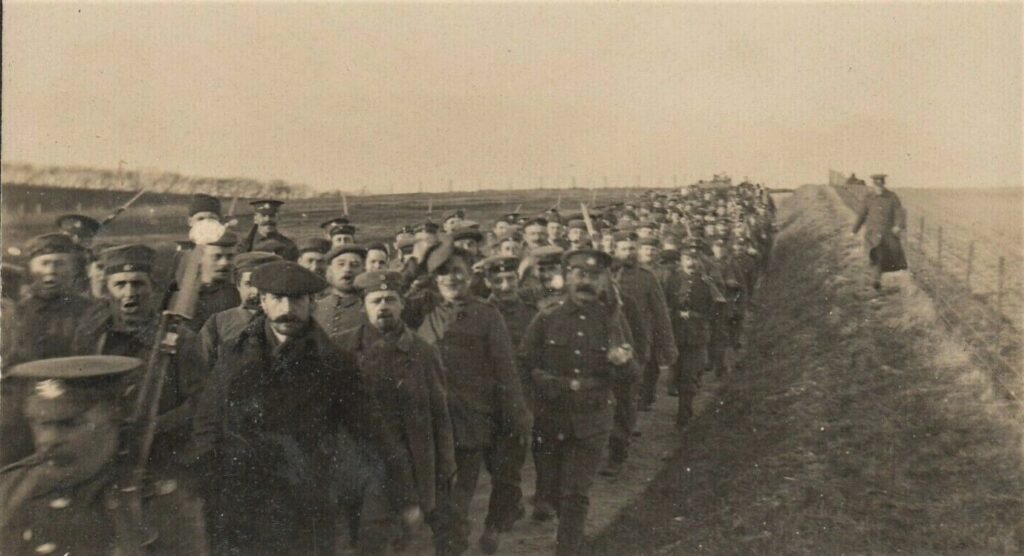
Dorchester was becoming a very busy town with all the POW’s being brought there and the military being housed. So was Blandford which was seeing an influx of new royal navy recruits who were billeted on the racecourse as a temporary location before being sent abroad, which was Blandford Camp.
Below is one of the recruitment posters issued to get local men to Join their county Regiment.
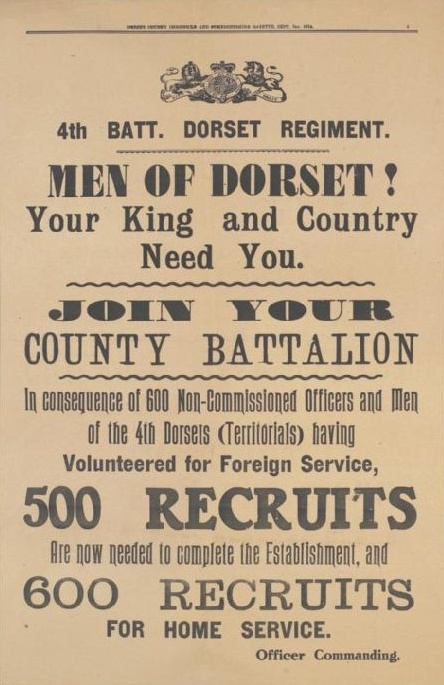
At the outbreak of war, our Army comprised of about 250,000 soldiers whereas, the German Army had about 1.7 million soldiers. So greater numbers were needed and by November after Lord Kitchener’s call to arms, another half a million had volunteered to join up as the new first army. They were all required to quickly support the BEF also known as “ The Old Contemptables ” who were in Belgium suffering horrendous casualties. At that point over a hundred of the Dorset police officers who qualified by age volunteered to join up, however the County still needed policing so only a few were allowed too.
On the 23rd August the Battle of Mons started in Belgium. Meanwhile at home in the Constabulary, staffing issues kept occurring and unfortunately were not helped as on the 5th September, when after a long painful illness Sgt Albert CULL died at Parkstone. Sgt CULL was one of the members of the original Tug Of War team that was so successful in the 1890’s for the Force. He suffered from phthisis and was described as a capable and reliable Sergeant. He left a widow and three children, ages 13, 11 and 7 years respectably and he had served for almost 19 years, the last 3 as a sergeant. The DSJC decided that his widow and children were entitled to a pay out of over 114 pounds to help their circumstances. Sgt Fred Henry ARNOLD moved to Parkstone to take CULL,s post and PC 139 Arthur JOLLIFFE was promoted from PC and moved to Maiden Newton replacing ARNOLD.
On the 11th September the British Government issued orders for the raising of the second new Army, which was to be of 6 Divisions, and two days later a 3rd Army was to be formed also with 6 Divisions. On 15th September, PC OLD was tasked to be another Drill Sgt with the Army.

This is a view of the prisoner of war camp behind the Dorchester Barracks looking west across the countryside, where on the 16th September five prisoners of war managed to escape, past the boundary of thick barbed wire and four flood lit wooden sentry platforms. A massive search took part and the local police checked all areas and sent out messages to other forces whereupon they were eventually caught up with days later at Southampton and Hartlepool.
PART 2 to follow